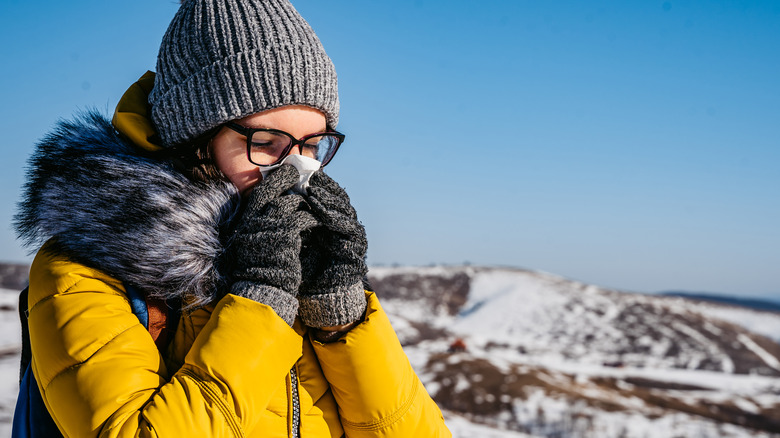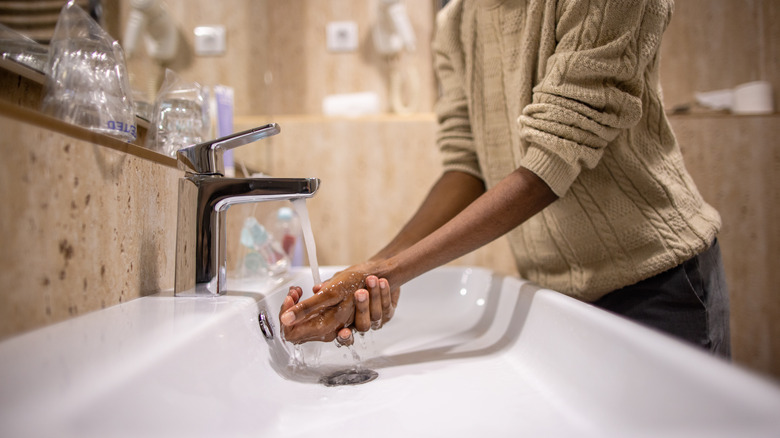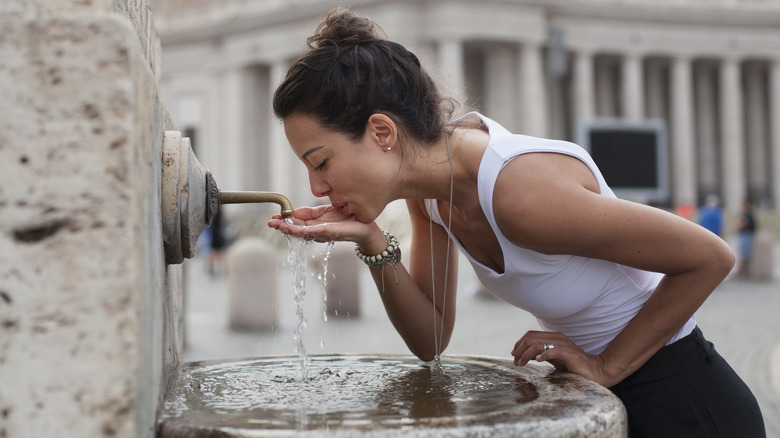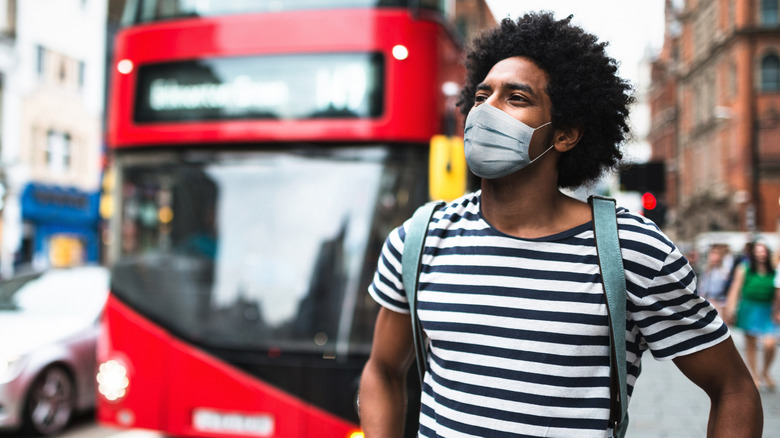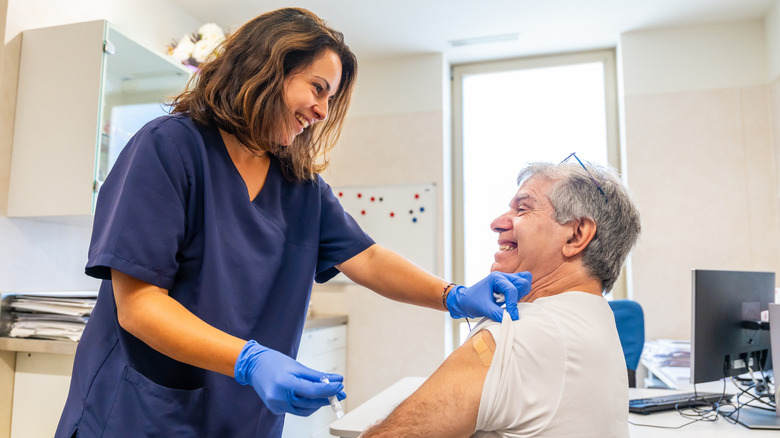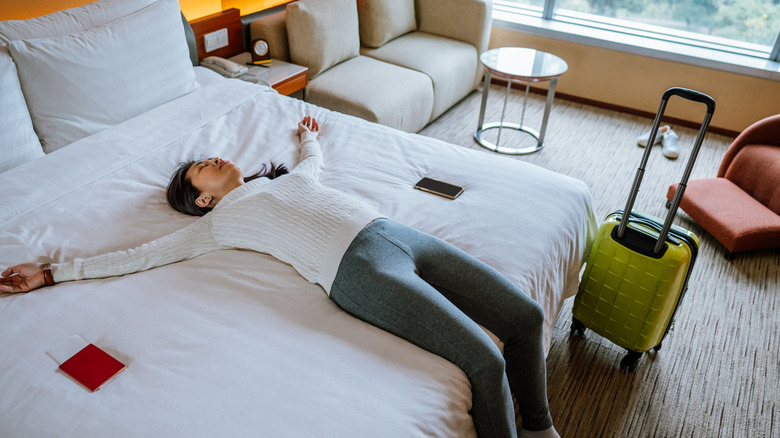5 Best Ways To Avoid Getting A Cold While Traveling, According To A Medical Officer
After months or even years of anticipation, weeks of planning, and a long flight, you finally arrive at your destination — only to feel that telltale little tickle in your throat. Getting a cold during your trip can be a frustrating inconvenience that forces you to miss out on seeing a few of the things that you flew halfway around the world to see. To find out how to avoid getting sick, Islands spoke to Dr. Jason Singh, Chief Medical Officer and Physician at One Oak Medical. Dr. Singh advised us that travelers should keep their hands clean, their immune systems strong, wear face masks when appropriate, stay up to date on their vaccines, and, if they do start seeing symptoms, take care of themselves for a quick recovery.
Even if you aren't usually prone to getting sick, you might find yourself coming down with something while you're away. According to Dr. Singh, there are a few reasons why you might be more likely to catch a cold while you're on vacation than you would usually be. "Travel can be stressful which can suppress the immune system by increasing cortisol levels. Cortisol inhibits T-cells which are responsible for immune response. Jet lag and changes in sleep patterns can disrupt circadian rhythm which plays a role in regulating immune function. Also, different geographical locations may harbor strains of viruses to which a traveler may not have been exposed to previously which can increase risk of infection."
Remember to wash your hands often and well
While it might seem obvious, if you're traveling, you might want to take extra care to wash your hands often and well. From the time you check in your bags at the airport until you're safely home again, Dr. Jason Singh reminded us that it's absolutely vital to maintain hand hygiene if you don't want to catch a cold or any nasty stomach bugs while traveling. According to Dr. Singh, scrubbing your hands with soap and water for a minimum of 20 seconds is the best way to get potential pathogens off of your skin before they have the chance to get into your system and make you feel sick.
If you are in a situation where you won't have the opportunity to wash your hands — like when you get off of the subway and immediately spot some particularly delectable street food that you've been excited to try — hand sanitizer can be an acceptable substitute. Dr. Singh advised: "use an alcohol based hand sanitizer that is at least 60% alcohol."
Boost your immune system
It's tempting to pack your schedule with things to do, such as staying out late to appreciate the nightlife and getting up first thing in the morning to show up to tourist hot spots to beat the crowds. In reality, it could keep you from fully enjoying your trip. The best line of defense you have against getting sick is probably the one you have naturally inside your body: your immune system. In order for your body to fight off colds the best it can, however, you need to give it the tools it needs. As hard as it can be to prioritize your health while you're away, Dr. Jason Singh told us: "This means getting adequate sleep, staying hydrated, and maintaining a balanced diet rich in vitamins, particularly Vit C, D, and zinc."
If you happen to be immunocompromised, it may be more difficult for your body to resist viruses and bacteria, both at home and when you travel. While it may not always be enough to keep you feeling fit and healthy, it may be even more important to practice the healthy, immune system boosting habits Dr. Singh recommends for everyone.
Bring a face mask for crowded areas
Whether you're taking a long flight around the globe or a bus between cities, transportation is a mandatory part of travel. Unfortunately, it's also an easy way to catch a cold. Flight attendants suggest having a mask with you during your flight to wear into airplane bathrooms, but Dr. Jason Singh takes that advice a step further. If you're going to be in an enclosed space with a crowd of strangers who may or may not be sick during your journey, Dr. Singh suggests bringing a face mask with you while traveling. Dr. Singh advises: "Use face mask in crowded areas to provide a physical barrier against respiratory droplets containing viruses."
Exactly what kind of mask you choose is up to you — what matters is that it keeps you from accidentally inhaling germs exhaled by anyone around you. In general, you're going to need a tight, high-quality mask like an N95 to keep out germs, but potentially more comfortable surgical or cloth masks are better than nothing.
Stay up to date on your vaccinations
While there's no vaccine for the various viruses that cause what we know as the common cold, you can get similar unpleasant symptoms from the flu and other respiratory illnesses. As Dr. Jason Singh told us that making sure that you are up-to-date on your regular annual shots before you head out on your trip can help keep you from coming down with any cold-like conditions which can wreck your trip, even if they aren't technically a cold.
Guidelines from the CDC echo this advice from Dr. Singh, stating, "Make an appointment with your healthcare provider or a travel health specialist that takes place at least 4-6 weeks before you leave. They can help you get destination-specific vaccines, medicines, and information." Although they won't help you with the common cold, which can occur anywhere in the world, there are other vaccines that might be a good idea for your trip, depending on where you are going. In addition to the flu vaccine suggested by Dr. Singh, when you provide your doctor with your itinerary, they may recommend other shots to keep you from getting sick on your trip.
Treat signs of illness right away
As frustrating as it can be to have to slow down your trip and take care of your body rather than rushing from destination to destination, if you start to get sick, you may have to take it easy. If, despite all of your best efforts to avoid it, you find yourself starting to catch a cold once you're already on your trip, Dr. Jason Singh advises: "try to get adequate rest and hydrate. Use OTC medicine judiciously. Gargle with salt water to reduce inflammation in the throat and may help flush out viral particles."
It can be hard to know what to do if you get sick while traveling, if you find yourself getting seriously ill, you may need to find professional medical help, whether that means getting an appointment with an English-speaking doctor at an international clinic or heading to the nearest hospital. Dr. Singh told us, "seek medical attention if symptoms are severe or persistent: High fever, difficulty breathing, or lasting more than 10 days."
